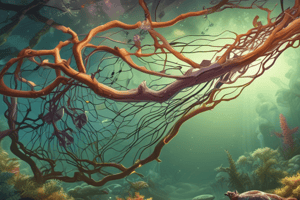Podcast
Questions and Answers
What is the primary focus of microbiology?
What is the primary focus of microbiology?
- The study of fossils
- The study of plants
- The study of microorganisms (correct)
- The study of animals
Which branch of biology deals with the study of the internal structures of organisms?
Which branch of biology deals with the study of the internal structures of organisms?
- Physiology
- Morphology
- Histology
- Anatomy (correct)
What does taxonomy focus on?
What does taxonomy focus on?
- Composition of plant and animal tissues
- Classification and naming of organisms (correct)
- Form and structure of organisms
- Functions of different parts of organisms
What is the meaning of the term 'biology' derived from?
What is the meaning of the term 'biology' derived from?
Which branch of biology involves the study of cells and their organelles?
Which branch of biology involves the study of cells and their organelles?
Paleobotany is a sub-branch of which main field?
Paleobotany is a sub-branch of which main field?
Which branch of biology deals with the formation and development of an embryo?
Which branch of biology deals with the formation and development of an embryo?
Which scientist first used the term 'biology'?
Which scientist first used the term 'biology'?
Flashcards are hidden until you start studying
Study Notes
Introduction to Biology
- Biology is the science of life, derived from the Greek words "bio" meaning 'life' and "logos" meaning 'to study'.
- The term "biology" was first used by Swedish scientist Carl Linneaus in 1736.
- Biology has three major divisions: botany (study of plants), zoology (study of animals), and microbiology (study of microorganisms).
Branches of Biology
- Morphology: studies the form, shape, and structure of organisms.
- Anatomy: studies the internal structures of organisms.
- Histology: studies the composition, structure, and functions of plant and animal tissues.
- Physiology: deals with the functions of different parts of organisms and the activities occurring in them.
- Embryology: deals with the embryo and the development of an organism from a fertilized egg.
- Taxonomy: studies the classification of organisms and their scientific naming.
- Cell Biology or Cytology: studies cells and their organelles.
- Paleontology: studies fossils of past organisms, including Paleobotany (study of plant fossils) and Paleozoology (study of animal fossils).
Key Concepts
- In biology, "structure" refers to any part of a living organism that can be seen with the naked eye or with a microscope.
Studying That Suits You
Use AI to generate personalized quizzes and flashcards to suit your learning preferences.




